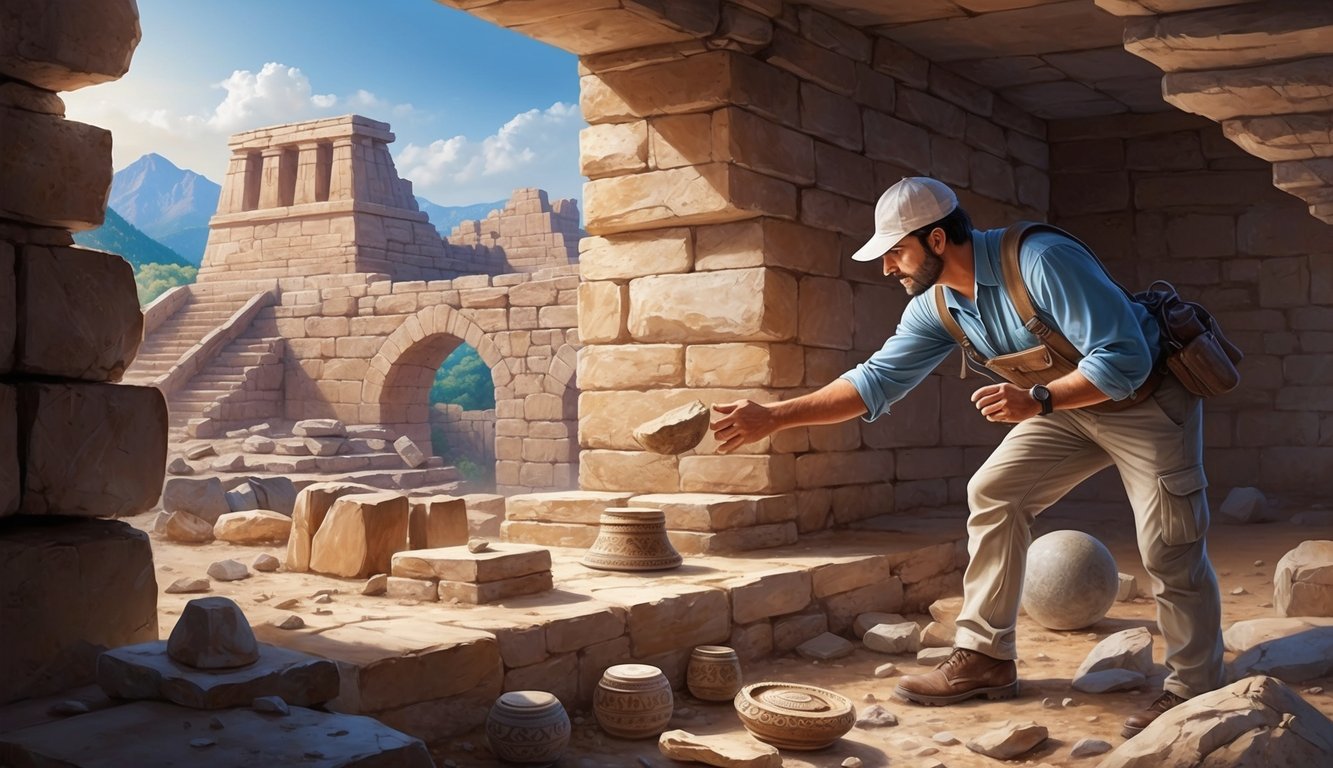Don’t Miss Out On This Unique Astrological Opportunity
Are you tired of spinning your wheels and getting nowhere? Simply put, you’re out of sync: you’re out of alignment with your astral configuration.
But: there’s a kind of map that can help you reclaim your alignment. Think of it as your own personal blueprint to success and happiness: a blueprint that will help you live your most amazing life.
Get started here.
Exploring Zion in the Bible can open your eyes to a rich history and spiritual insight.
Zion is often seen as a symbolic representation of the Holy City, deeply intertwined with stories and teachings in both Christianity and the Jewish Nation. Understanding Zion’s significance is key if you’re curious about how this ancient city relates to the spiritual journeys depicted in the Bible.
In Christianity, the idea of Zion is not just a physical location but a symbol of hope and salvation.
You might find it fascinating to learn that Zion represents a connection between God’s promises and the land of Israel, serving as a spiritual cornerstone for many believers.
The intertwining of Zion with religious beliefs can provide a deeper perspective on faith and divine presence.
By delving into how Zion is depicted in biblical literature, you can better appreciate its role in shaping religious narratives.
The prominence of Zion in stories and its spiritual implications highlight its importance, not just as a geographical site, but as a beacon of faith.
Engaging with these themes might deepen your understanding of how Zion influences religious traditions today.
Zion in the Hebrew Bible
Zion holds a unique place in the Hebrew Bible as both a physical location and a symbol of divine presence.
It represents various concepts including the fortress of King David and the dwelling place of God in Jerusalem.
Etymology and Symbolism
The term “Zion” often symbolizes strength and protection.
Initially, it was thought to mean “fortress” or “fortification.” This highlights its strategic importance as a stronghold.
Zion carries a deep spiritual symbolism, representing God’s holy domain.
In the Old Testament, Zion becomes a metaphor for security, spiritual refuge, and divine connection.
The Psalms, especially, highlight its importance by describing Zion as an everlasting, sacred place.
Zion’s dual significance as both a geographic and symbolic element enriches its role throughout biblical narratives.
Mount Zion and the City of David
Mount Zion refers to a hill in Jerusalem, traditionally associated with King David.
It becomes a pivotal location in biblical texts, marking where David captured the stronghold, as mentioned in 2 Samuel 5:7.
The City of David was built here, establishing Jerusalem’s central role in the narrative of the Jewish people.
King David’s establishment of Zion as a political and spiritual center helps to integrate it into the broader history of Israel.
Today, Mount Zion holds numerous religious and cultural sites, underscoring its continued importance.
Zion as the Dwelling Place of God
In biblical texts, Zion is often described as the divine residence of God.
This concept emphasizes God’s presence and commitment to His people, symbolized through the Davidic Covenant.
Zion becomes not just a city but a spiritual home for the faithful.
The presence of the Temple on Mount Zion further reinforces its significance.
The Temple symbolizes God’s tangible presence on Earth, making Zion a sacred space for worship and devotion.
This notion of divine inhabitation highlights the city as a hub for spiritual connection.
Prophetic Visions and Zion’s Role
Prophets in the Hebrew Bible often spoke of Zion, casting visions of hope and renewal.
Isaiah, in particular, portrays Zion as a place of redemption where God’s kingdom is realized.
These visions convey the idea of a future where Zion plays a central role in a renewed relationship between God and His people.
This theme of restoration parallels Joseph’s dreams in Genesis 37, where he envisions a future in which he rises to prominence and his family ultimately reunites.
Just as Joseph’s dreams symbolized divine providence and a greater plan, the prophetic visions of Zion offer reassurance that God’s promises will be fulfilled.
Through these portrayals, Zion emerges as a beacon of hope, much like Joseph’s journey from suffering to exaltation.
Zion is seen as a place of gathering for all nations, even extending beyond the Jewish people to encompass diverse groups, like those from Ethiopia.
This inclusive view underscores Zion’s potential as a unifying symbol for peace and divine justice.
These prophetic visions continue to influence religious thought today.
New Testament Perspectives
In the New Testament, Zion holds significant theological weight.
This discussion examines how the concept of Zion ties into the teachings about Jesus’ divine role and the insights shared by his apostles.
Jesus and the Heavenly Jerusalem
The book of Revelation vividly describes the Heavenly Jerusalem as a central symbol of hope and salvation.
As you read through the text, you’ll notice how Jesus is depicted as the pivotal figure who embodies the fulfillment of ancient prophecies.
His divine connection to Zion represents the ultimate realization of the Kingdom of Heaven.
The imagery in Revelation is rich with references to the New Covenant, presenting Christ as the Mediator between humanity and God.
Through Jesus, the idea of Zion shifts from a physical location to a spiritual realm, offering believers a glimpse into eternal life.
Zion in Apostolic Teachings
Apostolic teachings in the New Testament emphasize Zion’s role in the unfolding story of salvation.
Apostles like Paul and Peter often tied Zion to the establishment of Christian faith, portraying it as a foundation for the new community of believers.
Their writings integrate themes from the Hebrew Bible, highlighting how Zion serves as a metaphor for the Lord Jesus’ transformative power.
As you explore these texts, you’ll find the Kingdom of Heaven reinterpreted through the lens of Christ’s teachings, showcasing Zion as a symbol for unity and spiritual rebirth in the Christian journey.
Theological Significance of Zion

In the context of the Bible, Zion holds deep theological meaning.
It represents a place of protection, a symbol of the Church, and a spiritual cornerstone for the faithful.
Zion is tied closely to prophecy and the hopes for restoration and justice among the people of Israel.
Zion as a Metaphor for the Church
Zion is often seen as a metaphorical representation of the Church.
In the Bible, Zion is described as a beautiful city of God, much like how the Church is viewed as a community of the righteous.
This spiritual foundation serves as a gathering place where believers come together to seek justice and righteousness.
Zion provides a sense of belonging and stronghold, where the Church becomes a living embodiment of faith and hope.
The vision of Zion inspires unity and strength among believers, emphasizing the protective and nurturing role of the Church in guiding them towards spiritual fulfillment.
The Fulfilment of Prophecy
The concept of Zion is deeply connected to biblical prophecy.
It is foreseen as the New Jerusalem, a place of ultimate peace and restoration.
This fulfillment of prophecy is a promise that gives hope to the nation of Israel and believers worldwide.
The belief that Zion will be restored as a perfect city mirrors the journey towards spiritual fulfillment and justice.
This connection is vital for those who see Zion not just as a physical place but as a prophetic vision of what’s to come.
It symbolizes the triumph of good over evil and the establishment of a kingdom where God’s protection and justice prevail.
Spiritual Foundation and Stronghold
Zion acts as a spiritual foundation and stronghold for believers.
It is seen as the heart of the nation of Israel, where the divine presence offers protection and guidance.
This portrayal of Zion as a stronghold is one of the key elements that makes it important in biblical theology.
It serves as a reminder that righteousness and faith are central pillars for a strong and stable community.
Within this context, Zion is not just a geographical location but a spiritual landmark that signifies strength, belief, and perseverance.
Through its symbolism, Zion encourages you to seek strength in spirituality and reliance on divine guidance in times of trial.
Zion in Contemporary Judaism and Christianity

Zion holds a unique place in both Judaism and Christianity, symbolizing spiritual dreams and expectations.
It is rooted in religious texts and celebrated as a symbol of hope, faith, and divine promise.
Modern Symbolism and Significance
Today, Zion represents more than just a physical location in the Land of Israel.
In Judaism, it embodies hopes for peace and blessings.
Zion is often associated with Jerusalem, viewed as a center of worship and prophetic visions.
For Christians, Zion carries spiritual implications.
Often, it’s seen as a symbol of the heavenly city and the ultimate fulfillment of God’s promises.
Places of worship echo this ideal, emphasizing the connection between Zion and faith journeys.
Zion as a Pilgrimage Destination
For many, traveling to Zion is not just a physical journey but a spiritual pilgrimage.
In Judaism, visiting Zion means connecting with historic roots and the promises made to Judah, celebrating a rich heritage.
Christians also see Zion as a vital pilgrimage spot.
Visiting sites linked to biblical texts allows you to walk in the footsteps of prophets and deepen your spiritual understanding.
Churches often organize trips to foster community bonds and encourage faith reflection.
The Concept of Zion in Religious Practices
In religious practices, Zion is a beacon of prayer and meditation.
For Jews, references to Zion often appear in prayers and hymns, asking for blessings and the peace of the holy city.
Within Christianity, reflections on Zion occur during Church services, drawing parallels between the biblical Zion and modern faith experiences.
Zion is viewed as an exemplar of the kingdom of God, inspiring followers to live in faith and hope.
Archeology and Historical Insights

Exploring the intersection of archaeology and the Bible reveals fascinating insights into ancient cities and significant discoveries.
These findings can deepen your understanding of biblical events and their historical context.
The Ancient City: Findings and Facts
Archaeological digs in Jerusalem have uncovered many important sites.
One such site is the Jebusite Fortress, believed to be on the slopes of the City of David.
This fortress provides insights into ancient urban planning and fortification techniques.
Nearby, Mount Moriah, the site where Abraham is said to have prepared to sacrifice Isaac, holds deep historical and religious significance.
Excavations have also focused on the Temple Mount, which plays a crucial role in Jewish tradition as the location of the First and Second Temples.
Uncovering the Past: Significance of Discoveries
In your exploration of biblical archaeology, you must understand the significance of each find.
Discoveries related to the Ark of the Covenant can offer insights into ancient religious rituals.
Regions like Babylon and the Arab world have yielded artifacts linked to biblical narratives.
These findings help place religious events within a broader historical context.
The Hurrians’ influence showcases the blending of traditions and practices, enriching your appreciation of the region’s complex history.
These insights can transform how you perceive both ancient and biblical history.



